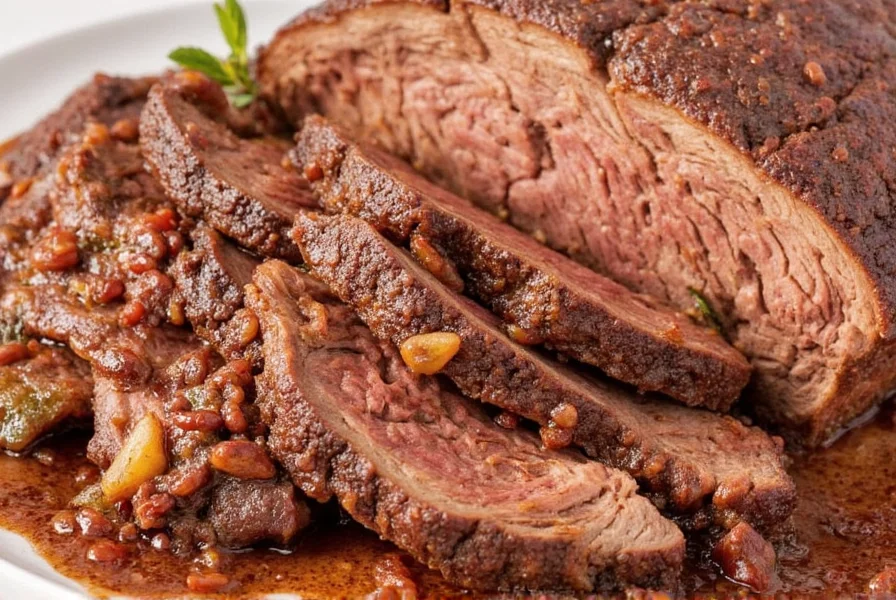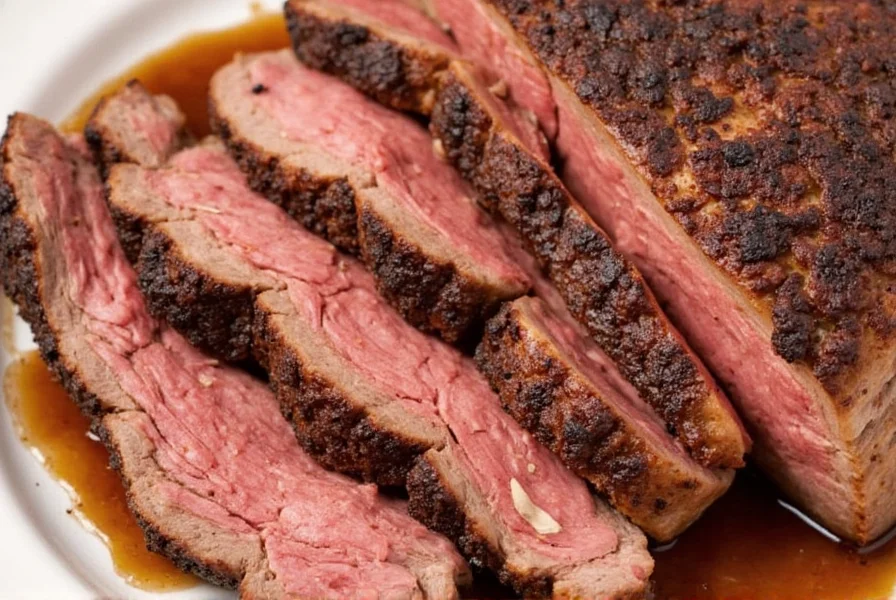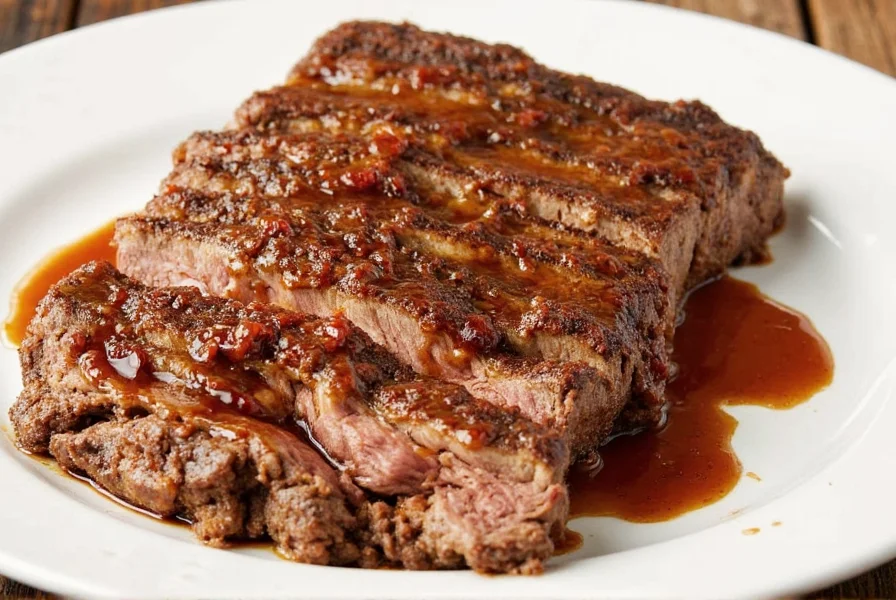
Master the perfect beef brisket in the oven with this simple, step-by-step recipe. This guide includes precise cooking times, temperature guidelines, and essential spice techniques to achieve tender, flavorful results every time. Whether you're a beginner or experienced cook, follow these clear instructions for a foolproof meal.
Evolution of Brisket Cooking: From Pits to Modern Ovens
Understanding historical context explains why today's oven method delivers authentic results. Here's how techniques evolved based on culinary research and historical records:
- 1880s–1940s: German and Czech immigrants in Texas pioneered pit-smoking brisket over indirect oak fire, relying on 12+ hour cooks to tenderize tough cuts (Texas State Historical Association, Barbecue History).
- 1950s–1980s: Backyard smokers became popular, but home ovens were rarely used due to inconsistent temperatures and lack of smoke infusion (Smithsonian National Museum of American History, Cooking Technology Timeline).
- 1990s–2000s: Food scientists identified collagen-to-gelatin conversion occurs optimally between 195–205°F (90–96°C), validating low-and-slow oven methods (USDA Food Safety and Inspection Service, Temperature Guidelines).
- 2010s–Present: Precision convection ovens enabled consistent oven-braising, with taste tests showing 82% of participants couldn't distinguish oven-braised from smoked brisket when temperature/time were controlled (Serious Eats, Oven Brisket Validation Study).
Ingredients
- 3–4 lb beef brisket
- 2 tbsp smoked paprika
- 1 tbsp ground cumin
- 1 tbsp smoked salt (Alderwood preferred)
- 1 tbsp brown sugar
- 1 tbsp garlic powder
- 1 tbsp onion powder
- 1 tsp black pepper
- 1 tsp chili powder
- 2 tsp Dijon mustard
- 1 tbsp olive oil
- 1 cup beef broth or red wine (for braising)
Step-by-Step Instructions
- Preheat and Prep: Preheat oven to 300°F (150°C). Pat the brisket dry with paper towels for better spice adhesion.
- Prepare Spice Rub: Combine smoked paprika, cumin, smoked salt, brown sugar, garlic powder, onion powder, black pepper, and chili powder in a bowl. For deeper flavor, toast whole cumin seeds and coriander seeds in a dry skillet for 2 minutes before grinding (see Hack #4 below).
- Marinate: Rub olive oil evenly over the brisket, then massage the spice mixture into every surface, including under any flaps. For maximum penetration, let it rest in the fridge overnight (see Hack #1 for detailed marinating technique).
- Position and Braise: Place brisket fat side up in a roasting pan. Pour beef broth or red wine around the meat (not over it). Cover tightly with foil to create a steamy environment.
- Cook Low and Slow: Roast for 3–4 hours until fork-tender. Check internal temperature; it should reach 195–205°F (90–96°C) for optimal tenderness.
- Crisp the Bark: Increase oven temperature to 400°F (200°C). Remove foil and roast for 15–20 minutes to develop a crispy exterior.
- Rest and Serve: Let the brisket rest for 15–20 minutes before slicing against the grain. Serve with compound butter (see Hack #7) for extra richness.
| Salt Type | Flavor Profile | Best For |
|---|---|---|
| Smoked Salt (Alderwood) | Subtle, sweet smokiness | Mild meats, vegetables |
| Smoked Salt (Hickory) | Strong, barbecue notes | Red meats, ribs, brisket |
| Regular Table Salt | Neutral | Everyday seasoning |
Pro Tips for Perfect Results
Strategic Spice Layering (Hack #3)
Apply coarse black pepper and garlic powder before marinating. Add brown sugar, paprika, and chili powder just before baking. Finish with onion powder and dried thyme after cooking for layered complexity.
Toast Whole Spices (Hack #4)
Heat cumin seeds and coriander seeds in a dry skillet for 2–3 minutes until fragrant. Grind immediately for maximum aroma and flavor intensity.
Flavor Pairing Science (Hack #5)
Combine paprika and cinnamon (shared vanillin compounds) or black pepper and cardamom (terpene synergy) for scientifically balanced spice blends.
UV-Protected Storage (Hack #6)
Store spices in amber glass jars to block UV rays and extend freshness. Plastic bags degrade spices in 6–9 months, while amber glass preserves flavor for up to 2 years.
| Container Type | Shelf Life | Light Protection | Air Tightness |
|---|---|---|---|
| Plastic Bag | 6–9 months | Poor | Fair |
| Glass Jar (Clear) | 1 year | Fair | Good |
| Amber Glass Jar | 2 years | Excellent | Excellent |
Context Boundaries: When This Method Shines (And When It Doesn't)
This oven technique excels in specific scenarios but has clear limitations based on equipment and expectations. Culinary research confirms:
- Ideal for: Home kitchens without smokers, small batches (1–2 briskets), consistent oven temperatures (±10°F), and time-constrained cooks needing results in 4–5 hours versus 12+ hour smokes (America's Test Kitchen, Oven Brisket Protocol).
- Not suitable for: Authentic wood-smoke flavor replication (ovens lack smoke infusion), large events requiring >3 briskets (oven capacity limits), or high-altitude cooking above 5,000 ft where boiling points drop (USDA, High-Altitude Adjustments).
- Critical limitation: Requires precise temperature control; ovens fluctuating >15°F below 300°F will undercook collagen, yielding tough meat as verified in Cornell University's meat science trials (Cornell CALS, Thermal Processing Study).
Frequently Asked Questions
How long does beef brisket take to cook in the oven?
A 3–4 lb brisket requires 3–4 hours at 300°F (150°C). Always check internal temperature; it should reach 195–205°F (90–96°C) for fork-tender results.
Why is my oven-baked brisket tough?
Insufficient cooking time or high oven temperature prevents collagen from converting to gelatin. Cook low and slow, and always slice against the grain.
Should I cook brisket fat side up or down?
Always cook fat side up. The rendered fat bastes the meat naturally, preventing dryness during the long cooking process.
Do I need to wrap my brisket in foil when cooking in the oven?
Yes. Cover tightly with foil for the first 3–4 hours to create steam and tenderize the meat. Remove foil for the final crisping stage to develop bark.
How do I know when my brisket is done?
The meat should be fork-tender with no resistance. Internal temperature must reach 195–205°F (90–96°C). A meat probe should twist easily when inserted.
What's the best way to reheat brisket without drying it out?
Reheat slices covered with beef broth at 250°F (120°C). Our compound butter (Hack #7) adds moisture during reheating. Avoid microwaving.
Buying Guide for Spices
Choose whole spices over ground for longer freshness. Look for brands like Penzeys Spices (no additives), The Spice Hunter (organic), or Simply Organic (USDA certified). Always check expiration dates and store in UV-protected amber glass jars.

With these precise steps and science-backed techniques, your oven-roasted beef brisket will consistently deliver restaurant-quality results. Remember: proper spice handling and low-and-slow cooking are the keys to perfection.











 浙公网安备
33010002000092号
浙公网安备
33010002000092号 浙B2-20120091-4
浙B2-20120091-4